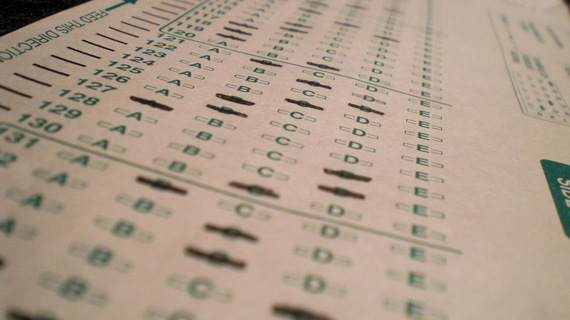"What's the best way to evaluate a teacher?"
The question, asked of me by one of the members of the National Teacher of the Year interview panel, was one I've been thinking about for a while.
"I'll answer that by telling you a story," I said.
Stories are how I make sense of anything. Partly because I'm just no good at remembering statistics and academic sources under pressure. Partly because I come from a clan of people who illustrate everything with a story.
My first year to teach Advanced Placement English was also my first year to feel completely successful as a teacher, if success meant getting perfect test scores. All of the AP students passed the test for graduation; half of them received academic recognition - meaning they answered all of the questions right and wrote high-scoring essays.
"I am a master teacher - be me," I joked to my colleagues.
But down deep, I nurtured an almost electric thrill at meeting this marker of "objective" teaching success. I wanted to believe my own joke.
Rattling around somewhere in that little raisin-sized conscience of mine, I knew the truth: I hadn't given much to those kids that they didn't already have. Sure, I taught them how to finesse a few things in their writing, how to do some closer reading of texts. But really, they would've scored almost as well with a substitute teacher. Because that really happened one year at my school.
The "permanent substitute," (one of my favorite education oxymorons), who took over a class for almost the entire school year, had better scores than veteran teachers. He had no classroom management; his class looked like a modern version of "Blackboard Jungle."
And yet, "his" scores were not the worst in the department.
Which brings me round to another part of my story. That first year for AP was also my first year to teach two classes of refugee students. And they took the same graduation test as my AP students.
Spoiler alert: no one passed.
"I'm the worst teacher in the world," I thought. "I should be fired." Because once you factored in my ESL students' scores, my 100 percent perfect average became 50 percent, making me - officially - the worst teacher on my campus.
And so I put to you the same questions I used to end my story at the interview:
"Which is the truth? Was I the worst teacher? Or the best teacher? And upon what criteria are you basing your answer?"
And that, dear reader, is the same spot we find ourselves in wherever teachers are judged solely on test scores.
I'm not even good at math, but here's my statistical probability prediction: Where, what, and who you teach will show similar patterns of "successful" and "failing" schools and teachers across your district.
Any district.
And yes, please test me on that.

